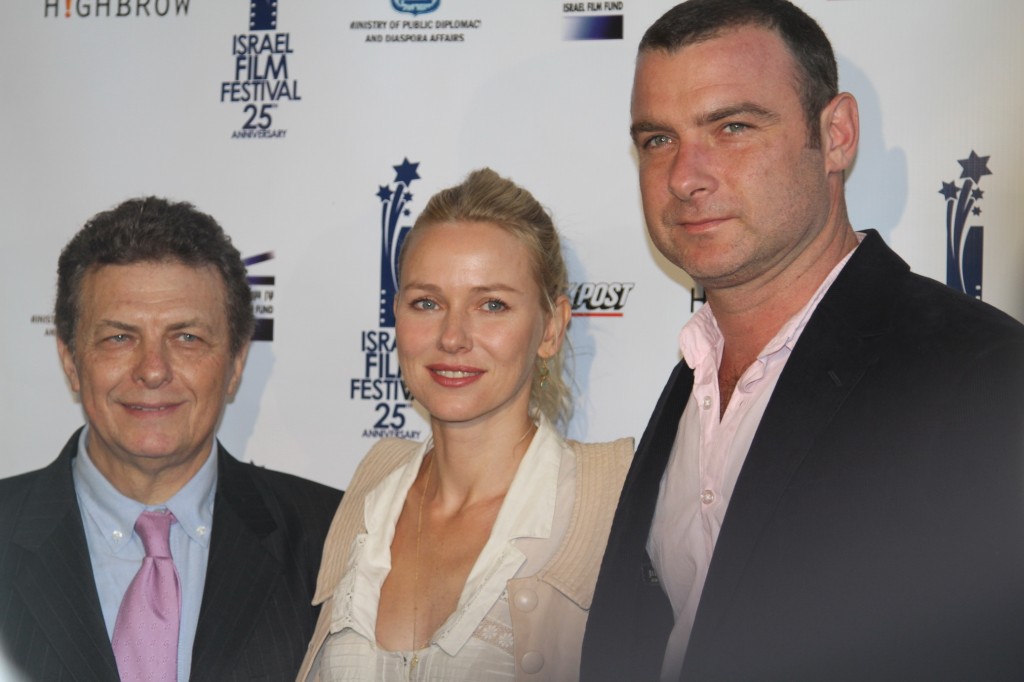Reinvention of a Genre: The 25th Israeli Film Festival
10 May2011
The opening gala of the Israel Film Festival (IFF) was held at the Plaza Hotel in New York City in a traditional Hollywood manner with red carpet, cocktails and posh Michal Negrin jewelry gift bags, but it was nonetheless setting up a festival that looks to break old stereotypes and present new takes on the Israeli experience.
“While Israeli movies used to focus on heavy political and social problems, the young generation of movie makers are focused on the art of creating more in-depth characters and real drama,†said Adam Sanderson, co-director of “This is Sodomâ€, the most popular movie in Israel’s history with 600,000 viewers within a year. He is a leading figure of the young generation of directors who are not intimidated to give a new, cooler spin on Israeli cinema.
Micha Shagrir, the veteran Producer and Director who was there to be presented with the 2011 IFF Cinematic Achievement Award, commented, “When we came to this industry we felt obliged to say important things about our great nation. Today Israelis’ lives are so hard and they see so much aggravating news on television all the time; when they go out to the movies, they want to see something lighter.â€
Sanderson’s cast and crew started out making “Eretz Nehederet†(“Wonderful Country”, a Saturday Night Live-esque Israeli television show) before branching out to the big screen. “This is Sodom†addresses a biblical, somewhat sacrilegious topic, much like Britain’s Monty Python did with “Life of Brian†before them, making light of the last week of Sodom before its destruction. “I don’t think art should be obliged to anything, otherwise it becomes propaganda, like the army films of the sixties,†Sanderson said, and then added, “Our movie is really out there.â€
During the cocktail reception film makers noted part of the heavy subject matter was due to the low opinion of comedies and “fun†movies by Film Academies around the world. “Art used to be so stiff, so formal in Israel. People didn’t make comedies because they were afraid of not appearing intellectual enough,†Sanderson noted with a smile. Despite his popularity in Israel, Sanderson dressed in casual urban outfit that would fit into any more casual cultural event. He stood out in a crowd of those who represented the old guard, in cocktail dresses and tuxedos, looking to mingle with famous Hollywood figures like legendary director Stanley Donen (“Singin’ in the Rainâ€, “Charadeâ€), who received the 2011 IFF Lifetime Achievement Award.
There had been an informal exchange between Israeli and Jewish film makers in Hollywood prior to the Festival’s creation, but the IFF has worked and succeeded to bring Hollywood a little closer to Tel Aviv. Giants like Ronald S. Guttman, Michael Douglas, Dustin Hoffman, Arnon Milchan, Avi Arad, Marc Canton, Michael Douglas, Richard Dreyfuss, Meyer Gottlieb, Penny Marshall, David Matalon, Mike Medavoy, Rob Reiner and Jane Rosenthal have all been involved in helping bring a spotlight to the finest new Israeli films for American audiences.
The stars of this year’s gala were young Hollywood actors Liev Schreiber and his partner Naomi Watts. Schreiber received the 2011 IFF Outstanding Achievement in Film Award for acting in movies like “Defianceâ€, portraying Jewish resistance fighter Zus Bielsky, and his debut as film director of “Everything is Illuminated,†a film based on Jonathan Safran Foer’s novel. Shreiber said, “I feel grateful for this industry for allowing me to explore my heritage, faith, and identity for these past 18 years. I’ve also gained a better sense of what it means to be a human being.†Regarding Israeli films Schreiber noted, “What I love the most about Israeli cinema is that since it is a relatively new industry, it has a deep sense of what is right.â€
“There are a lot of Jews in Hollywood but they don’t make movies about Jews.â€
Even though during its 25 years the Israeli Film Festival has featured more than 400 filmmakers, 1000 films and had 900,000 viewers, organizers said its success is much smaller than that of the Jewish film festivals’. Ron Guttman, chair of the IFF noted in his speech at the gala, “The New York Jewish Film Festival is always packed at Lincoln Center, but the Israeli Film Festival unfortunately still has a stigma. I really want to change [that] and take the festival out of the Israeli, foreign film bubble.â€
Israeli film makers don’t understand the differentiation between Israeli and Jewish cinema: “The only difference I see between Israeli and Jewish film makers is their physical location: inside or outside of Israel,†Sanderson said. Shagrir saw a larger difference however, “There are a lot of Jews in Hollywood but they don’t make movies about Jews.†Even though a lot of Jewish filmmakers are extremely successful, there is still a stigma about Israeli films. Often, even among Jewish audiences.  “Why don’t Israeli documentary movies succeed in Jewish film festivals even though they are great? Think about it: “When Israel went outâ€, a great movie about Ethiopian Jews had been only accepted by the Jewish film festivals once it succeeded at non-Jewish audiences.†Festival organizers hope that the broad variety of films will be able to break through stereotypes about Israel and reach wide audiences engaging in a different communication about the full reality of Jewish existence. The Academy Award-winning Documentary Short “Prescious Life†about a Palestinian child being saved in Tel Aviv hospital is premiering on HBO this May after an appearance in the festival.
“The movie industry is like a restaurant: it should offer not only hummus but sushi too,†Sanderson said. This year’s Israel Film Festival promises to showcase truly diverse stories of modern Israeli life and the country’s rich culture between May 5 and 19. Most films will be showing at the AMC Loews on 84th Street.
PatrÃcia Eszter Margit is an author, cultural critic, journalist, sociologist and community organizer originally from Hungary. Her writings have appeared in the Jewish Telegraphic Agency, Jerusalem Report, Nepszabadsag (the largest Hungarian daily), Szombat (Hungarian Jewish cultural magazine), and Marie Claire magazine. She is the author of The Jewish Bride, a bestseller published in Hungary in 2009. Eszter now lives in New York where she became a Jewish bride herself.







